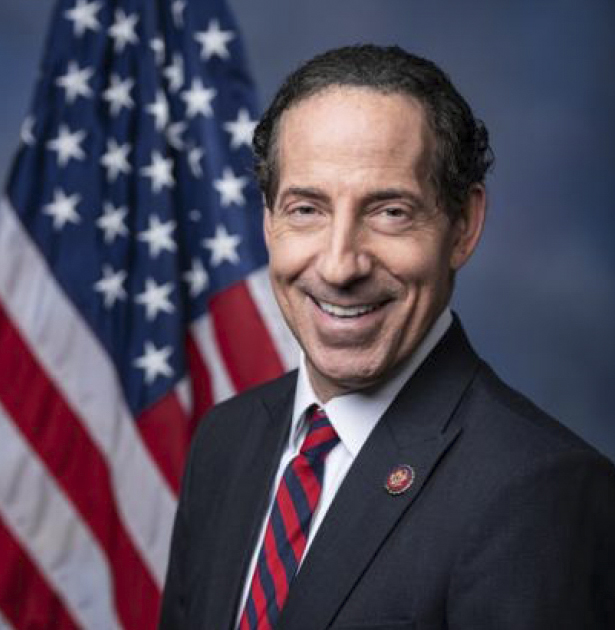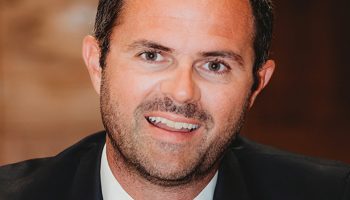Sometimes it takes extreme trauma or loss to understand the true meaning of courage. When the unthinkable happens, one of two things can occur: everything stops, pauses and we are unable to go on, or we push forward.

U.S. Rep. Jamie Raskin (D-Md) chose the latter. A span of seven days in which the unthinkable happened forced him to push through for the rest of his life.
He will give his lecture, “It’s Hard to Be Human: The Political, Philosophical, and Mental Health Struggles of Tommy Raskin,” at 2 p.m. today in Norton Hall to start Week Eight of the Interfaith Lecture Series “New Profiles in Courage.”
Today’s lecture was changed from the Hall of Philosophy, the traditional ILS location, for security purposes. That decision was made several weeks prior to the attack on Salman Rushdie last Friday in the Amphitheater.
Week Eight, programmed in partnership with Ford Foundation President Darren Walker, has been in the works since early 2021. And when considering speakers, everyone involved in planning wanted to extend an invitation to Raskin.
“I think what we’ve been most intrigued by is how he responded to a pretty deep personal tragedy all alongside being a national leader,” said Chautauqua Institution President Michael E. Hill. “You’ve got this narrative of personal tragedy and national trauma happening at the same time.”
Raskin lost his son, Tommy, to suicide on Dec. 31, 2020, just seven days before the Jan. 6 insurrection, and two weeks before Raskin presided over President Donald Trump’s second impeachment trial. The three separate events each required three different kinds of courage.
Raskin and his wife, Sarah Bloom Raskin, took to their Medium account on Jan. 4, 2021, with an essay-length statement in tribute to their son.
That essay, and their courageous candor of public grief, went viral. As in the essay, in an interview with The Chautauquan Daily, Raskin discussed the passions Tommy had in his life, both politically and philosophically.
“Tommy was a dazzling young man. He was a playwright, poet and a stand-up performer,” Raskin said. “He was a second-year student at Harvard Law School. But he was really a philosopher and confronted all of the major problems in philosophy and tried to work them out on a daily basis.”
Raskin said he wants to use his platform, at the Institution and writ large, to raise awareness and to honor people who have loved ones who struggle with mental health.
“Tommy battled depression in the last few years of his life and felt trapped and suffocated by it,” Raskin said. “This is a great agony and misfortune for all of us in his family and friends who loved him.”
Along with Tommy’s philosophical views, Raskin said he was a “passionate vegan,” who rejected the eating of animals as “barbaric and unnecessary cruelty.”
Tommy was also opposed to war and violence, and supported causes like Amnesty International, humane societies and other groups advancing human rights and animal welfare.
“Although he didn’t make much money as a young man, in his different jobs, whatever he did make, he pretty much gave away to the groups that were doing the work he believed in,” Raskin said.
The family wants to eventually pull together a book of Tommy’s essays, poetry and meditations to share what he had to say.
“It’s a very beautiful mission,” Raskin said. “It’s also a very tough assignment to live that way. We lost him all too early, but there are lots of things that all of us can learn from his life.”
Raskin wants to highlight Tommy’s life, and his lasting impact, his “profound moral, political and philosophical commitments, and those things are of intrinsic value to us,” and how those commitments intersected with his mental health crisis.
There were many emotions I experienced on Jan. 6, in the middle of the violence and assaults on the Capitol. One feeling I did not experience was fear, because we had already just experienced the worst thing that could ever happen to a parent.”
—JAmie Raskin
U.S Representative (D-Md),
United States Congress
Seven days after Tommy died, on Jan. 6, 2021, Capitol Hill was stormed, while Raskin’s family was in town.
“I was extremely concerned for Tabitha, our younger daughter, and for Hank, who’s our son-in-law, married to our older daughter, because they were in the Capitol and they were hiding … as the mob pounded on the door outside,” Raskin said. “I was concerned about where everything was going.”
Although he was concerned for his family and his country, Raskin said he did not experience fear himself.
“There were many emotions I experienced on Jan. 6, in the middle of the violence and assaults on the Capitol,” Raskin said. “One feeling I did not experience was fear, because we had already just experienced the worst thing that could ever happen to a parent.”
Raskin was the lead impeachment manager for Trump’s second impeachment trial on Jan. 13, 2021. He started writing his book, Unthinkable: Trauma, Truth, and the Trials of American Democracy, shortly after all of these events.
“The book began as a love letter to my lost son, Tommy, and it became a love letter to America, too,” Raskin said.
Raskin’s mother was a journalist and novelist; growing up, he said he remembers her typing away on her typewriter late at night, and he felt connected to her while writing the book.
“I wrote my book in a five-month period of pretty intense insomnia after we lost Tommy and after the impeachment trial,” Raskin said. “I would come home from Capitol HIll around dinner time, (and then) around 8 p.m., I would just start writing and write pretty much throughout the night.”
Beyond Raskin himself, Hill said Raskin’s book perfectly complements the week of “New Profiles in Courage.”
“He was looking for a way to respond, about love and crisis, and was hoping that his story might help many families,” Hill said. “It becomes this perfect example of someone being called to be courageous at a time when I think many of us might want to not be at all public.”
In Unthinkable, Raskin describes the conversation he had with Speaker Nancy Pelosi prior to the impeachment trial, when she asked him to be the lead impeachment manager. Raskin said he wasn’t eating or sleeping, and was unsure if he would be able to move forward.
“I felt Tommy in my chest and my heart, and something deep inside me told me that I needed to do this,” Raskin said. “Nancy (Pelosi) really threw me a lifeline because she was saying that they needed me and I needed to rally and help bring people together to do this thing.”
Raskin said he was initially shocked when Pelosi asked him, but he felt it was his duty.
“It was the hardest moment I’ve had, in personal terms, and she was asking me to do the most difficult thing I’d ever done professionally,” Raskin said. “But she was telling me that I was needed. … It was how I began to reconnect with the ordinary rhythms of life the best that I could.”
People describe him as courageous, and Raskin said people often use the word in connection with him and Rep. Liz Cheney (R-Wyo), as both were heavily involved in the impeachment trial and now with the Jan. 6 Committee. Where some may see courage, Raskin said he sees it as more necessity.
“I don’t think Liz Cheney has felt like she’s had any other real choice, and I certainly didn’t,” Raskin said. “There was no way for me to turn away from the trial and leave our (Jan. 6 committee) team without turning away from everything that I believe in.”




